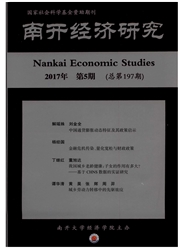

 中文摘要:
中文摘要:
在全球价值链的背景下,中间品贸易已成为进出口贸易的重要组成部分。本文基于新经济地理理论,在D-S框架下,引入FDI,建立两国三要素三产品的NEG模型,从理论上探讨了投入产出的多要素垂直关联,从而诠释FDI对中间品贸易、最终品贸易结构的影响机制。本文运用引力方程,利用面板数据对理论模型进行实证检验,实证结果表明:最终品贸易、中间品贸易、FDI与两国GDP呈正相关;最终品贸易、中间品贸易和FDI三者间呈现互补关系。这说明经济体的经济规模对中间品贸易影响较为重要;FDI对最终品出口的影响主要以最终消费品出口为主;外资企业倾向于进口高新技术零配件和半成品,这也从侧面表明,随着FDI的流入,中国在全球生产网络中的地位在逐步升级。
 英文摘要:
英文摘要:
In the context of the global value chain, the intermediate goods trade has become an important part of the international trade. In the D-S framework, we establish a NEG model which includes two countries, three industries and three products. The model explains how FDI affects intermediate and final goods trade. The paper uses panel data to empirically test the theoretical model. The empirical results show that the final goods trade, intermediate goods trade, FDI and GDP are positively correlated. The empirical results also show that the final goods trade, intermediate goods trade and FDI present complementary relationship. It suggests that the economy of scale has an important effect on intermediate goods trade. It also suggests that FDI has a more important effect on final consumer goods. The results show that the position of China in international production networks is improved with the increase of multinational FDI to China.
 同期刊论文项目
同期刊论文项目
 同项目期刊论文
同项目期刊论文
 期刊信息
期刊信息
